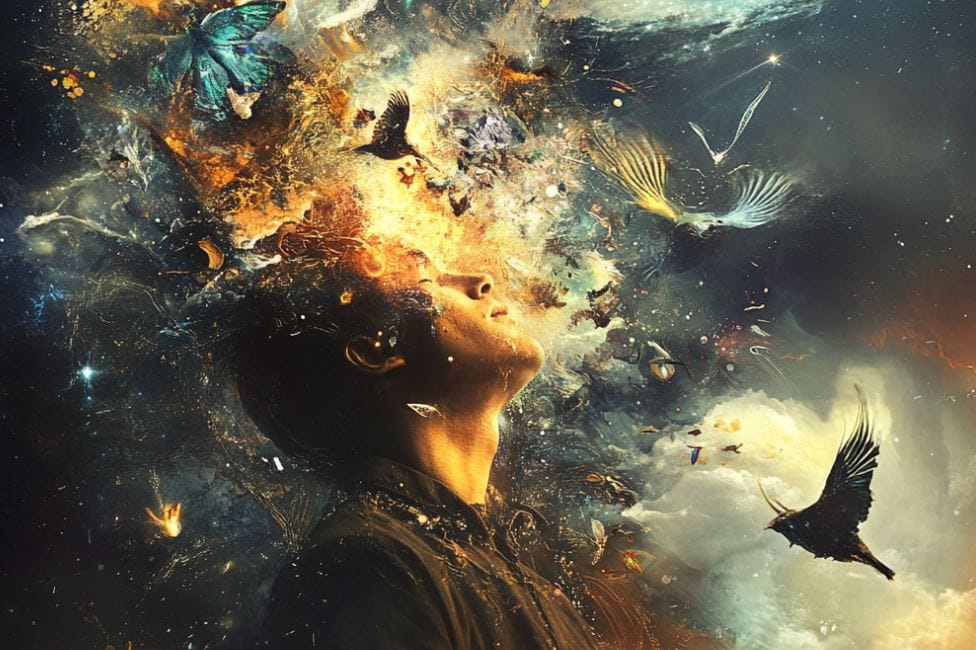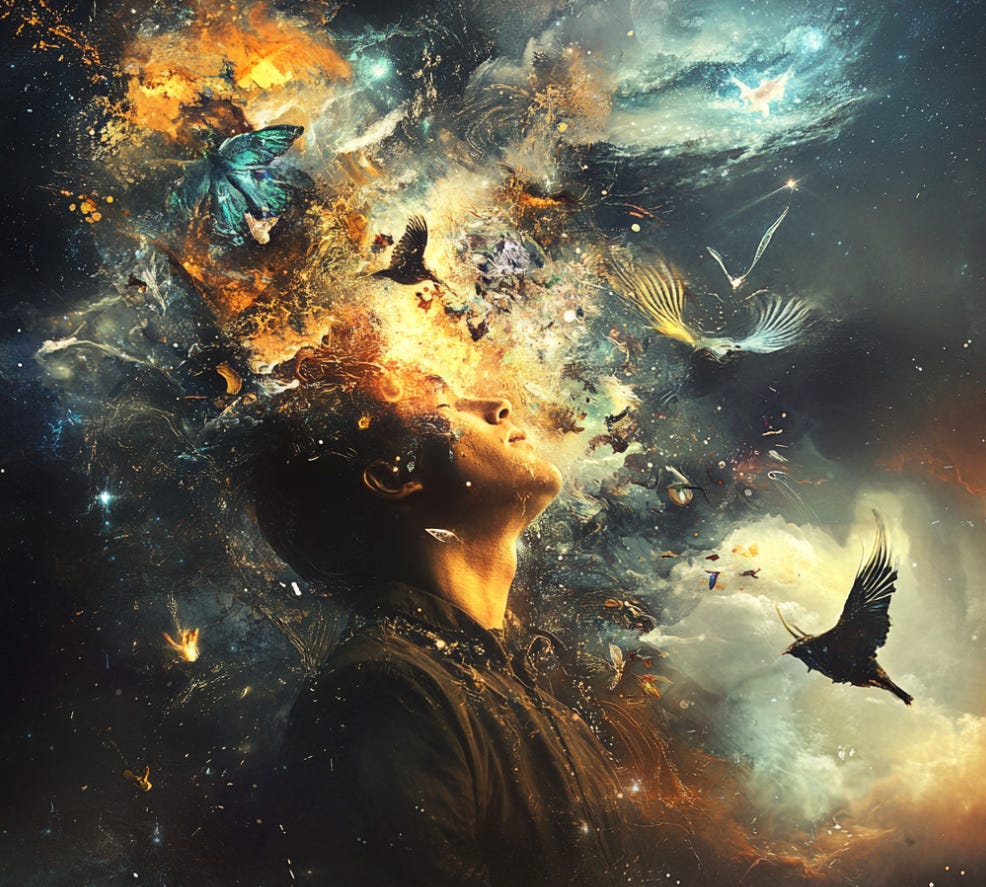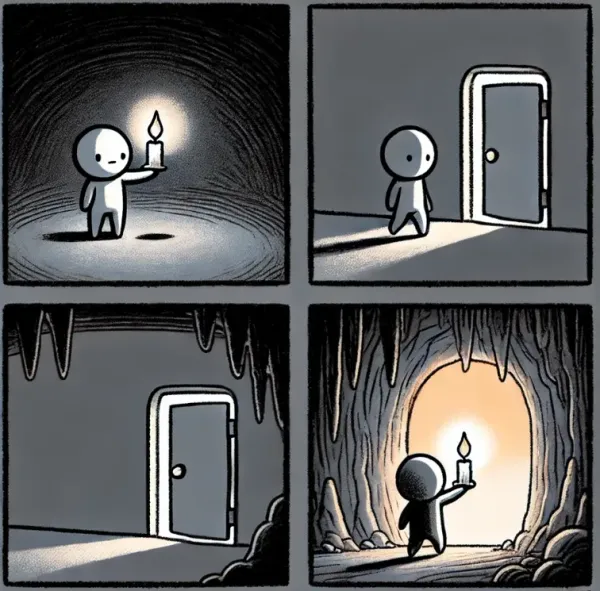"Accelerating Wisdom" Episode 7: Dreams and Synchronicity
The world is speaking to you, it just isn’t using words

- Article #7 of 8 in the Accelerating Wisdom Series.
- Guest expert: Dan Lawrence. Dan is an exceptionally experienced consultant psychotherapist and depth psychological researcher. His expertise is in Jungian analysis, synchronicity and dream analysis. He recorded an incredible lecture specially for this episode.
- Woo rating: 8/10 (all Leading Edge content will have a “woo rating” reflecting how far from the current consensus worldview it is. But we will never cover topics without direct practical applications).
One of the core themes of the series, and a hallmark of wisdom itself, is the importance of attributing intelligence to things outside yourself. This episode explores how a radical new understanding of environmental feedback, particularly your dreams, can help you find your power and purpose in life.

The Taboo of Synchronicity
As we explored in Episode 2, evolution optimises for differentiation and integration. As this attractor force acts on you, it draws you into a unique niche, that we explored in Episode 4. This means finding the place where what only you can do meets what the world needs. But this leads to perhaps the biggest question of your life: how do you know what the world needs of you?
The process of finding your unique differentiation is a felt sense. It feels like meaningful flow. Not all flow is meaningful. Slot machines and Call of Duty generate weaponised flow, but in a closed system. In the absence of environmental feedback we can get stuck in stale loops. How do we know when our flow is meaningful? How do we know when we are achieving both differentiation and integration? One answer is that our daily life turns from a grind to a challenge. Another answer is simply feedback. Openness to the correct external feedback is a primary functional requirement for wisdom.
Conventional success and wealth are possible indicators that you’ve found your niche. But one of the clearest signals is synchronicity; a felt-sense of meaningful coincidence. Synchronicity is most commonly associated with psychologist Carl Jung. His definition is: “the coming together of inner and outer events in a way that cannot be explained by cause and effect and that is meaningful to the observer.”
Synchronicities tend to accelerate, cluster or become more obvious when we’re on the correct path. What better way for the intelligent reality we inhabit to show us we are in sync with it? And yet synchronicity isn’t a part of our mainstream worldview: it has the scarlet letter of pseudoscience slapped prominently on its Wikipedia page (hence the 8/10 woo rating for this episode).
This makes me recall the most chilling experiment from Dr. Iain McGilchrist’s neurological studies. If you suppress the brain's right hemisphere for ten to fifteen minutes, people start to see living things as dead. So other human beings become like zombies, or machinery, or furniture. If you experimentally suppress the brain's left hemisphere for ten to fifteen minutes, people start to see things they would ordinarily see as dead as alive. If we're currently culturally imbalanced towards the left hemisphere, the implication is that the world is both more alive, and we are more connected to it, than we typically think. For millennia other cultures have had a direct relationship to their environment. But in today’s left-hemisphere locked world the mere idea is taboo. The left hemisphere sees its own narrow worldview as total, lies and is competitive with the right. The idea that we might somehow benefit from surrendering to a environmental intelligence is among the most heretical ideas in Western science.
Moreover, trying to convince other people of the meaningfulness of synchronicities meant just for you is a rapid way to sound psychotic. You cannot communicate the feeling that accompanied the experience, and any single coincidence can be dismissed as luck. It is a felt-sense because it is an environmental signal, it’s a relational force. Hence your ability to navigate your own synchronicities also depends on your level of embodied sensitivity.
If the world is speaking to us, we need to learn how to become better listeners.
The Neglected Language of Dreams
"Dreams, with their symbolic content, and synchronistic events, with their meaningful coincidences, both serve as guides in the individuation process, revealing hidden aspects of the self and suggesting new directions for personal growth."
-Carl Jung
How do we seek environmental feedback? The first and most obvious answer is to pay really close attention. It’s about very carefully watching for synchronicities or responsive reality.1 Back in Episode 3,
River Kenna and I discussed the general concept of “metis.” Rather than a discrete practice, metis describes a general state of awareness. The classicist and mystic Peter Kingsley describes this as “a particular quality of intense alertness that can be effortlessly aware of everything at once.” This strikes me as a description of perfectly balanced hemisphere function: narrow left and broad right. It’s a state of awareness that can notice and explore any subtle signals and feedback.
The other generally neglected resource is the ancient technology of engaging with our dreams. This episode’s guest is consultant psychotherapist and depth psychological researcher Dan Lawrence. Dan isn’t just the most qualified mental health professional I’ve ever met, he’s also fascinating because he started life as a currency trader. He now applies those pattern-recognition skills to the analysis of dreams. He recorded a spectacular lecture specifically for this series “The Wisdom of Dreams: A Jungian Orientational Approach.” His voice is also incredibly soothing. (Spotify link here).
Dan talks about how our world is “waking centric” and needs to take the value of dreams far more seriously. Of all the topics and practices in the series, I previously knew the least about dreams. There are so many fresh perspectives in the lecture, including a mindblowing idea. Dan argues that dreams should be considered as having objective, not just subjective content. For example, he talks about a client who dreamed of a huge millipede crawling on his arm. The client’s subjective interpretation was that the millipede was scary, and so it represented a potential risk in his life. And yet when he and Dan stepped back and analyzed this particular species of African millipede objectively, they realized it’s completely harmless. In fact, it repels predators with a foul-smelling substance. This alternative interpretation might have reflected a way that Dan’s client was repulsing others in his life. [Dan gives lots of other fascinating examples of this subjective/objective distinction in the lecture].
This presents a wild implication: that our dreams somehow contain information that originates outside of us, thus they will also provide insights that aren’t yet known to us. So rather than rush to analyze the meaning of a dream in personal terms, we should be curious and let its meaning unfold over time.
While this is at odds with our modern current perception of dreams, it meshes nicely with a central conclusion of this episode and the entire series: that the outside world has more intelligence than our limited egoic intellect. In fact, the content of Dan’s lecture reinforces and adds to all of the key messages of this series,2 and it was produced entirely independently. Which is always encouraging!
Dan describes synchronicity and dream symbolism as “the language of fields.” The world communicates with us, it just doesn’t tend to use words, because they are a relatively recent and low-fidelity addition to human evolution. As the late, great author Cormac McCarthy put it.
“The answer is simply language is very recent, a hundred thousand years maybe. It's a blink. But the unconscious has been there instructing you and helping you along for a million years or more. It's just not used to it… it had to show you pictures.”
This has been well known to scientists, innovators and visionaries who received so many of their breakthroughs through the symbolism in dreams.3 So if you aren’t even making an effort to remember your dreams, think about what guidance you might be missing. A good start is to keep a notebook next to your bed (see below for more ideas). Dan also recommends getting into the habit of deliberately falling into the phrase in your mind “I had a dream that..”, but applying it to your waking life. So if you meet with Steve in real life, you can begin to connect waking dreaming with night time dreaming by reframing it as “I had a dream that I met Steve.”4 I’ve noticed I’ve now started to see a hidden symbolism emerging in my waking life.
One of the most fascinating aspects of paying greater attention to your dreams is that they then seem to respond by becoming more vivid and communicative. There is even an (8/10 woo, but well-documented)5 phenomenon of this stronger relationship sometimes leading to precognitive dreams. This idea is also more plausible once we consider the idea of dreams being the objective language of the reality we inhabit.
The Purpose of Integration
Peter Kingsley's 2018 book Catafalque is probably the most interesting thing I've read since Dr. Iain McGilchrist's masterpiece The Matter with Things. Kingsley argued that Jung was a prophet who deliberately spoke in the language of science.
An idea that’s generally neglected by modern culture is that “spirituality” has primarily been pursued in service of the collective. This insight is at the heart of Kingsley’s work. In a lecture from 20116 he repeatedly and forcefully made this point that spirituality isn’t about the ascension of an individualist hierachy of consciousness, but for the benefit of the entire community. Equally, the hero’s journey isn’t finished until he comes home to the village with the treasure. The very name of the myth, and its centrality to virtually all cultures, indicates that this isn’t some fringe skill, but the human ideal. There is no differentiation without integration.
In a remarkable podcast with Michael Philip, Erick Godsey brings all of these ideas together in a powerful one minute clip.7
One of the things that Jung teaches that has sat with me the most is that his quote: “if I can get the neurotic to make art, they will heal themselves.”... What Jung doesn't say, but what I think Peter Kingsley is trying to argue, is that what Jung actually said through his behavior is that the fullness of the individuation process is what Jung went through, what he actually did. Which is you get to the point of individuation where you recognize that you are a vessel to this other force inside of you. And then you're going to have to midwife what it's trying to help you midwife. And what it's trying to help you midwife is for the collective consciousness. And it's going to almost kill you.
Individuation is both differentiation and integration in service of yourself and the collective. It is finding the niche where attractors can work with you and through you. This inversion of the competitive ego in service of co-creation is what makes the transitional period (discussed in Episode 4) so harsh. But it’s worth it because surrendering to that force that is trying to work through you, becoming integrated into the world, makes life incredibly enjoyable. Anxiety is the difference between what you can control and what you want to control. When you start to notice that your environment is guiding you, via dreams or synchronicity, the responsibility for every decision gets partially offloaded from your overworked and underqualified intellect.
This allows you to find the flow where what only you can do meets what the world needs. And that place is blissful.
Suggested Experiments and Commitments:
If you’re interested in taking the benefits of these concepts beyond the screen and into your own life, here is a recommended short-term experiment and longer-term commitment.
Experiment:
- Keep a notebook next to your bed and start writing down your dreams upon waking. Or you could download the Temenos Dream app. This allows you to set a Siri shortcut to verbally dictate a dream immediately upon waking. You can even use their AI to get objective analyses of keywords (I have no affiliation, I’ve just used it a few times). One surprisingly effective practice is simply to pose a question to your unconscious before you go to sleep: even something as simple as “what do I need to learn?”
Commitment:
- Treat your entire life as if you’re receiving intelligent feedback from the world. Attune to the felt sense that accompanies a potential coincidence. I’ve been recommended the “Living the Numinous Life" logbook as a practical way to implement this philosophy, but haven’t started it yet.
Join us in a couple of weeks for our final episode on New Frontiers with Dr. Mona Sobhani.
Thanks again to Dan Lawrence for all his help and wisdom! Hit Subscribe to follow the rest of the series.
Footnotes + Additional Resources:
Apply here to become a member of the 150 person network (already close to capacity!) for private expert Q&A calls and the small private WhatsApp.
Transcript on request
Footnotes
1 I really enjoyed this passage from Scott Britton:
“Nothing has had a bigger impact on my consciousness journey than working with my response to life.
You don’t have to go on a retreat.
You don’t have to change jobs.
You don’t have to ingest any substances.
All you have to do is begin noticing and become the chief investigator of your inner space.
When you start to work with life this way, the responsive reality brings you a steady stream of continuous growth opportunities to your doorstep every single day. This is your curriculum which is perfectly orchestrated. All you need to do is pay attention and make it a priority to get the lessons. And in the absence of receiving them, my experience is the lesson will keep coming until you finally get it. Over time the compounding growth that comes with this type of daily transformation is remarkable.”
2 I especially enjoyed this insight from Dan Lawrence:
“At one point or another in a person's life, and having worked with thousands of people in a psychotherapy room, I can say this with confidence, just about everybody wonders at some point if there is some mysterious force organizing dreams and body symptoms, synchronicities, events in the universe. Spiritual people call it God. Jung calls it Unus Mundus or the unconscious. Atheists might say there's no such thing or, or else ask the physicists or something. Physicists might call it the grand unified kind of field theory or the mind of God or grand design or something like that.
And the truth is unsettling, right? If we're to recognize that there are powers of an invisible world, however understood, it has to broaden and deepen the view of our lives. has to help us to continually reassess our values and make more difficult choices because if this exists, then it communicates something to us. And there's a challenge there. We might be comfortable in the way that we're living, but there is a message to maybe consider something different in that sense.
So we have to embrace a psychology that goes deeper than just kind of surface level of things, than just the cognitive level of things, the behavioral level of things. We have to open to a possibility that there is an invisible kind of dynamically active world that we live in a mystery. And this is a prospect that is both daunting and inviting to dilatory consciousness really. But of course, the most ancient technology available to us to broaden and deepen is to work objectively, curiously with dreams and images in a sense.”
3 Cormac McCarthy’s essay “The Kekule Problem” is excellent.
4 But maybe keep an Inception-style spinning top totem handy so you don’t lose track of reality. Kidding. I think.
5 Gary Lachman wrote a fascinating article on this topic titled I Dream the Future - And So Do You.
6 Source: The Great Taboo: A Story Waiting to Happen.
7 Source: Individuation & The Ancient Wisdom of the Psyche, Erick Godsey




